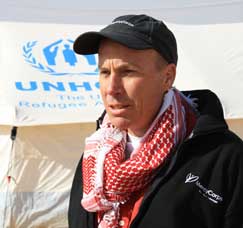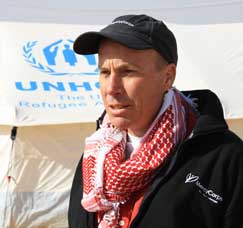 KINGSTON, RI – July 11, 2013 – Imagine living in a tent with a handful of household items, surviving on a few buckets of water daily and relying on donated food to feed your family.
KINGSTON, RI – July 11, 2013 – Imagine living in a tent with a handful of household items, surviving on a few buckets of water daily and relying on donated food to feed your family.
This is the world for 120,000 Syrians living in Za’atari refugee camp, a former patch of desert in Jordan that is now the country’s fourth-largest city, home to men, women and children fleeing a civil war that has claimed the lives of nearly 100,000.
Working to help the refugees is Robert Maroni, a University of Rhode Island graduate and Warwick native who is country director in Jordan for Mercy Corps, a global relief organization.
“It’s an absolute crisis,” says Maroni, in Rhode Island for a few weeks to visit family. “Most people cross the border with just the shirts on their backs. They can’t work legally; they have kids, no food, no clothes. It’s a huge undertaking to ensure their basic needs are met.”
The refugee crisis in Jordan is worsening by day. Already one of the most water-strapped countries in the world thanks to a decade-long drought, Jordan is seeing its water supplies dwindle even more with the influx of refugees.
Some aid workers worry that tensions between Jordanians and the refugees could escalate with the summer heat. What’s worse, the two-year war in Syria shows no sign of ending, with the regime of President Bashar al-Assad and the rebels digging in.
To escape the bloodshed, a staggering number of refugees cross the border every day: more than 3,000, most of them on foot at night to avoid being shot and carrying nothing more than a knapsack of belongings, if they’re lucky. Some 600,000 refugees are already in Jordan, and observers speculate that hundreds of thousands more could cross if the war drags on for years.
Food and housing can be airlifted in, but not water. Maroni and his team of 100 local and expatriate staff workers are managing 10 projects, including a $20 million project funded by the U.S. Agency for International Development to refurbish Jordan’s failing municipal water system.
In the Za’atari camp, the organization has also built a modern pump station and chlorination system capable of providing clean water to 65,000 refugees a day. A similar water system is being built by Mercy Corps in a new refugee camp under construction in the central-eastern city of Azraq.
Mercy Corps has also drilled two deep wells up to 1,800 feet to reach underground reservoirs.
But water is not the only focus.
Mercy Corps has built seven playgrounds in refugee camps and trained Syrian refugees to be child care minders.
“A lot of the kids have seen really awful stuff that they should never see,” he says. “Every time I go to the camp I go to the playgrounds and pick up some of the smaller kids and hold them and play with them until I see a smile. You can tell they really yearn for attention. Providing a little bit of happiness to the children is definitely the ‘feel good’ part of my joy.’
Many children, he says, have witnessed horrible acts: “Their villages have been blown up, their houses destroyed. They’ve seen people getting shot. They’ve seen death and destruction. They’ve seen the ugly side of humanity.”
Raised in Warwick, Maroni attended Toll Gate High School and graduated from URI in 1987 with a bachelor’s degree in biology. He ran his own construction company for several years, but longed to work overseas.
“I always had a passion for traveling,” he says. “I’d do a project, then take a couple months off, put on my backpack and travel. I met some interesting people during my trips, and I started figuring out how to transition to live an interesting life overseas and help people.”
He had no experience working abroad, so, in 1993, he joined the Peace Corps. He spent two years in the Western African country of Cameroon, teaching woodworking and building a habitat for chimps and baby gorillas. He spent a third year in the West Indies, teaching carpentry to teenagers.
After the Peace Corps, he obtained a master’s degree in sustainable international development at Brandeis University.
By 1997, he was working in Rwanda, rebuilding villages for Hutus returning from Tanzanian refugee camps to a country ravaged by genocide. From there, he moved to Eritrea, where he coordinated an HIV prevention project from 1999 through 2004 for Population Services International, a nonprofit group based in Washington D.C.
Maroni joined the nonprofit Mercy Corps in 2004, working as country director in Zimbabwe. He helped children orphaned by the country’s HIV epidemic and improved water supplies in rural villages. For the last 3½ years he’s been in Jordan.
“It feels good to help people – absolutely,” says Maroni. He and his wife, Nadia al-Alawi, and their two girls, ages 10 and 12, live in Amman, Jordan’s capital. Maroni met his wife in Cameroon while she was backpacking through the area.
“We’ve been overseas together since 1997,” says Maroni.
Not long ago, Maroni was talking to a high school friend from Warwick, Jim Nash, about the refugee camp and told him that the children have no toys.
Nash reached out to his employer, Hasbro, Inc., in Pawtucket. Mercy Corps’ need fell within Hasbro’s giving guidelines and a short time later the company shipped 11,000 games and toys, including Mr. Potato Head, Transformers and PlayDoh.
Destination: poor Jordanian youngsters and the children of Za’atari.
Pictured above: Robert Maroni, a University of Rhode Island graduate and Mercy Corps country director for Jordan. Maroni, a Warwick native, is helping Syrian refugees fleeing a civil war in their country.
Photo courtesy of Robert Maroni
Mercy Corps is helping 19 million people worldwide recover from disasters, build stronger communities and find their own solutions to poverty. Since its founding in 1979, the group has provided $2.2 billion in assistance to people in 114 countries.
For more information, visit www.mercycorps.org.

